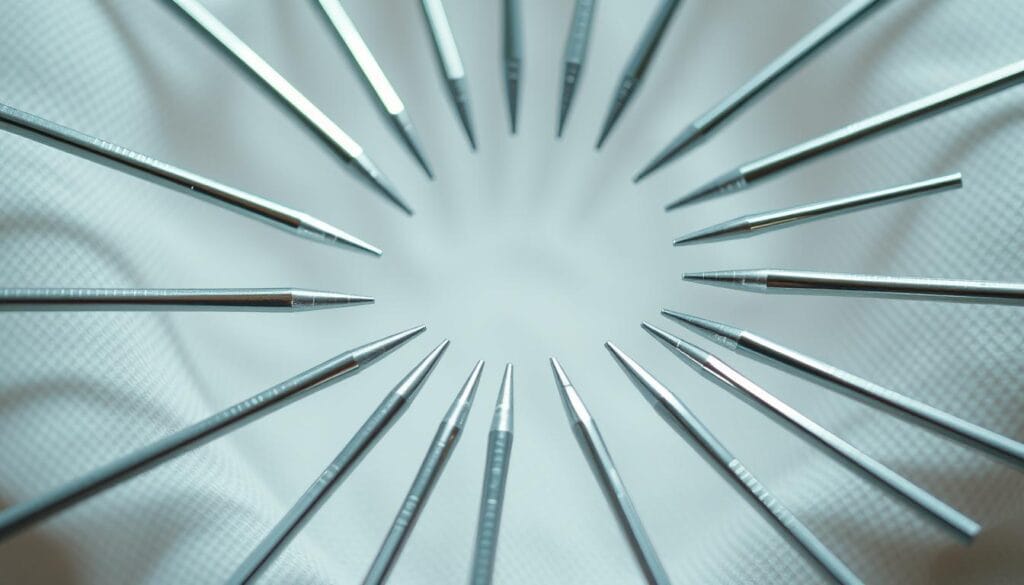Uncategorized
Scared of Needles
For many people, the mere thought of needles can trigger a surge of anxiety and fear. This deeply-rooted phobia, known as trypanophobia, is more common than you might think. Estimates suggest that up to 25% of the population experiences some level of needle fear, making it one of the most prevalent specific phobias worldwide.
Needle phobia is not just a minor inconvenience – it can have a significant impact on an individual’s physical and mental well-being. Those affected may avoid or delay crucial medical procedures, putting their health at risk. The psychological distress caused by this fear can also lead to broader challenges in one’s daily life.
Overcoming the fear of needles is possible, but it requires a comprehensive understanding of the issue and a willingness to address it. In this article, we’ll explore the roots of needle phobia, the impact it can have, and the strategies that can help individuals confront and manage this common fear.
Key Takeaways
- Needle phobia, or trypanophobia, is a widespread condition affecting up to 25% of the population.
- This fear can lead to avoidance of essential medical procedures and broader challenges in daily life.
- Understanding the psychological roots of needle anxiety is the first step towards overcoming this common phobia.
- A range of techniques, from exposure therapy to relaxation strategies, can help individuals manage and confront their fear of needles.
- With the right support and approach, it is possible to develop a more positive and accepting attitude towards needles and medical procedures.
Understanding the Fear of Needles
Trypanophobia, the persistent and irrational fear of needles, is a common condition that affects individuals of all ages. This phobia can significantly impact a person’s quality of life, leading to avoidance of necessary medical procedures and causing significant distress. Understanding the root causes and common symptoms of this fear is the first step towards overcoming it.
What Is Trypanophobia?
Trypanophobia, derived from the Greek words “trypano” meaning “to pierce” and “phobos” meaning “fear,” is a specific phobia that involves an intense and persistent fear of needles. This fear can extend beyond just medical procedures, with some individuals experiencing anxiety even at the sight of sewing needles or other sharp objects.
Common Symptoms of Needle Fear
- Rapid heartbeat and sweating
- Trembling or shaking
- Feelings of nausea or dizziness
- Avoidance of medical appointments and procedures
- Panic attacks or anxiety attacks
The Psychological Roots of Needle Anxiety
The fear of needles often stems from a combination of factors, including past traumatic experiences, learned behaviors, and the body’s natural response to perceived threats. Some individuals may have developed a fear of needles due to a painful or unpleasant medical procedure in the past, while others may have learned the fear from family members or peers. Additionally, the body’s stress response, which activates the fight-or-flight mechanism, can contribute to the physical symptoms associated with trypanophobia.
“The fear of needles is a common phobia that can have a significant impact on an individual’s health and well-being. Understanding the underlying causes and symptoms is the first step towards overcoming this challenge.”
The Impact of Needle Fear on Daily Life
Needle phobia, or trypanophobia, can have a profound impact on an individual’s daily life. This debilitating fear can lead to the avoidance of necessary medical procedures, as well as emotional and mental health considerations that extend far beyond the doctor’s office.
Avoidance of Necessary Medical Procedures
One of the most significant ways that needle fear affects daily life is the avoidance of essential medical procedures. Individuals with trypanophobia may skip routine check-ups, vaccinations, blood tests, and even life-saving treatments due to their overwhelming anxiety about needles. This can have serious consequences for their overall health and well-being, as they may miss crucial opportunities for early detection and prevention of medical issues.
Emotional and Mental Health Considerations
Beyond the physical health implications, needle phobia can also take a toll on an individual’s emotional and mental well-being. The constant stress and worry about encountering needles can lead to increased anxiety, depression, and even panic attacks. This can interfere with daily activities, work, and personal relationships, further impacting the quality of life for those affected.
Interestingly, the fear of needles is not limited to medical settings. Even non-medical needles, such as those used in knitting or sewing, can trigger distress and avoidance behaviors in individuals with trypanophobia. This can limit their participation in hobbies and creative pursuits, further isolating them from everyday activities.
Overcoming needle phobia requires a multifaceted approach, which may include exposure therapy, relaxation techniques, and the support of healthcare professionals. By addressing this fear and finding ways to manage it, individuals can regain control over their daily lives and access the medical care they need without hesitation.
Understanding Needles and Their Uses
In the world of healthcare, needles play a crucial role in various medical procedures. From administering vaccinations to drawing blood for lab tests, these small yet essential instruments are ubiquitous in the medical field. Understanding the different types of needles and their functions can help alleviate the fear and anxiety associated with their use.
Different Types of Needles in Healthcare
The most common type of needle used in healthcare is the hypodermic needle. These needles are designed to puncture the skin and deliver medications, vaccines, or fluids directly into the body. Another type of needle often seen in healthcare settings is the acupuncture needle, which is used in traditional Chinese medicine to stimulate specific points on the body to promote healing and well-being.
In addition to these, there are various other specialized needles used for specific medical procedures, such as intravenous (IV) needles, suture needles, and biopsy needles. Each type of needle is designed with a specific purpose in mind, ensuring that healthcare professionals can provide the most effective and efficient care to their patients.
How Needles Function in Medical Settings
Needles serve a vital function in medical settings, allowing healthcare providers to access the body’s internal structures and deliver necessary treatments. The hollow design of medical needles allows for the injection or withdrawal of fluids, medications, or bodily samples. The sharp point of the needle enables it to puncture the skin and reach the targeted area with precision, ensuring the safe and effective administration of various medical interventions.
By understanding the different types of needles and their roles in healthcare, patients can better prepare for and navigate medical procedures that involve the use of needles. This knowledge can help reduce the fear and anxiety associated with these common medical tools, ultimately leading to a more positive healthcare experience.
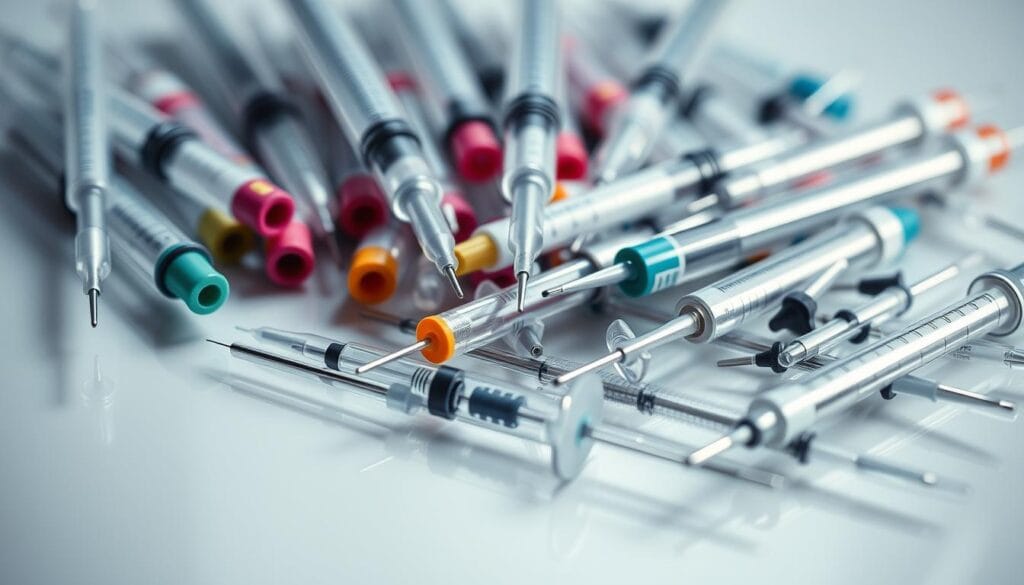
Common Scenarios Triggering Needle Fear
For individuals with trypanophobia, or the fear of needles, certain common medical and healthcare scenarios can be particularly challenging. From routine vaccinations to blood draws and injections, these situations can trigger intense anxiety and avoidance behaviors. Understanding the specific triggers can help those affected better manage their phobia and seek appropriate support.
Vaccinations and Immunizations
One of the most common needle-related scenarios that provokes fear is the administration of vaccinations. Whether it’s a routine childhood immunization or a travel vaccine, the prospect of the injection can cause significant distress. This fear can lead to delays or outright refusal of essential vaccinations, putting one’s health at risk.
Blood Draws and Lab Tests
Another common trigger for those with needle phobia is the need for blood tests and other laboratory procedures. The sight of the needle, the anticipation of the pinprick, and the physical sensation of the blood draw can all contribute to heightened anxiety and avoidance. This can result in individuals skipping necessary medical tests or delaying important diagnostic procedures.
Injections for Medication
Receiving injections for medication, such as insulin for diabetes or allergy shots, can also be a major source of fear for those with trypanophobia. The thought of the needle penetrating the skin can evoke a strong physiological and emotional response, leading some individuals to refuse or postpone essential medical treatments.
It’s important to note that needle fear is not limited to the medical field. Even scenarios like getting a tattoo or piercing can trigger significant anxiety in those with a phobia. Understanding the specific triggers and seeking appropriate support and coping strategies is crucial for managing this common issue.
| Scenario | Potential Impact | Coping Strategies |
|---|---|---|
| Vaccinations and Immunizations | Delays or refusal of essential vaccines | Exposure therapy, deep breathing, distraction techniques |
| Blood Draws and Lab Tests | Avoiding necessary medical tests and procedures | Topical numbing creams, communication with healthcare providers |
| Injections for Medication | Refusal or postponement of essential treatments | Gradual desensitization, cognitive-behavioral strategies |
Techniques for Overcoming Needle Fear
Confronting the fear of needles, known as trypanophobia, can be a daunting task, but there are proven techniques that can help individuals overcome this common phobia. One such approach is exposure therapy, which involves gradually exposing the individual to the source of their fear in a controlled and safe environment.
Exposure Therapy and Gradual Desensitization
Exposure therapy works by gradually and systematically exposing the individual to needles, starting with non-threatening objects like embroidery needles and slowly progressing to medical needles. This gradual desensitization helps the person become more comfortable and less anxious around needles, ultimately overcoming their fear.
Deep Breathing and Mindfulness Techniques
Mindfulness practices, such as deep breathing exercises, can also be highly effective in managing needle-related anxiety. By focusing on the present moment and employing relaxation techniques, individuals can learn to control their physiological responses and reduce the intensity of their fear.
Cognitive Behavioral Strategies
Cognitive behavioral therapy (CBT) is another powerful tool for overcoming needle fear. This approach helps individuals identify and challenge the negative thoughts and beliefs that contribute to their anxiety, replacing them with more positive and rational perspectives. By addressing the psychological root of the fear, CBT can lead to lasting changes in behavior and emotional response.
Overcoming needle phobia takes time and practice, but with the right techniques and support, individuals can learn to manage their fear and lead more confident, comfortable lives. Whether it’s exposure therapy, mindfulness exercises, or cognitive behavioral strategies, exploring these approaches can help individuals reclaim their independence and embrace necessary medical procedures without undue anxiety.
The Role of Healthcare Providers
In the journey towards overcoming needle fear, healthcare providers play a pivotal role. Their expertise, empathy, and patient-centric approach can make a significant difference in helping individuals confront and manage their trypanophobia, or fear of needles.
Importance of Patient Education and Support
Effective patient education is the cornerstone of addressing needle anxiety. Healthcare providers must take the time to explain the purpose and process of medical procedures involving needles, dispelling myths and misconceptions. By fostering open communication and addressing patients’ concerns, they can help alleviate the anxiety associated with needles.
Moreover, healthcare providers should offer compassionate support throughout the process. Acknowledging the patient’s fear, validating their emotions, and providing reassurance can go a long way in building trust and making the experience less traumatic.
Techniques Healthcare Workers Can Use
- Utilize distraction techniques, such as encouraging patients to focus on their breathing or engage in conversation about neutral topics.
- Employ numbing creams or patches to reduce the sensation of the needle, making the procedure more comfortable.
- Suggest visualization exercises, where patients imagine a peaceful, calming scene to redirect their attention.
- Provide a calm and reassuring presence, using a gentle tone and slow, deliberate movements to instill a sense of control and safety.
By adopting these patient-centric approaches, healthcare providers can play a vital role in empowering individuals to overcome their fear of needles and access the medical care they need, whether it’s for routine vaccinations, blood draws, or other important procedures.
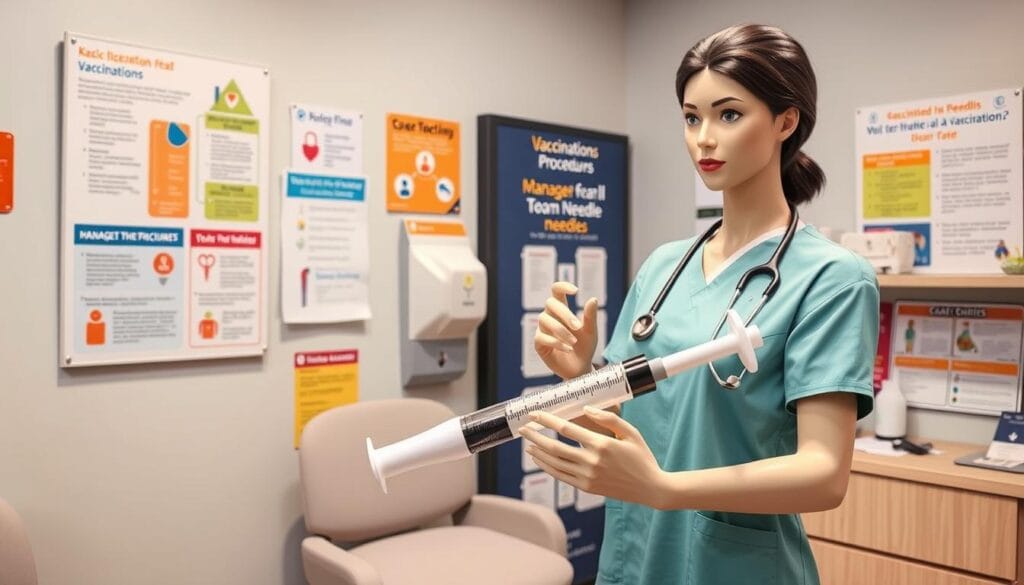
“The best healthcare providers are the ones who listen, empathize, and work with the patient to find the most comfortable solution.”
The Importance of Speaking Up
Effective patient communication is a cornerstone of quality healthcare. When it comes to the fear of needles, or trypanophobia, speaking up and advocating for oneself is crucial. Patients should feel empowered to openly discuss their concerns with healthcare providers, as this can lead to more personalized and compassionate care.
How to Communicate Needle Fear to Providers
The first step in overcoming needle anxiety is acknowledging it. Patients should not be afraid to express their fear to their healthcare team. Some helpful tips include:
- Explain the specific aspects of needle procedures that cause anxiety, such as the sight of the needle or the feeling of the insertion.
- Describe any past negative experiences that have contributed to the fear.
- Ask the provider to walk through the process step-by-step and provide information on what to expect.
- Request accommodations, such as the use of a topical anesthetic or the presence of a supportive loved one.
Finding Advocacy in Healthcare Settings
Patients should not feel alone in their struggle with needle fear. Many healthcare providers are trained to recognize and address this common phobia. Patients can advocate for themselves by:
- Seeking out providers who are known to be patient and understanding of needle anxiety.
- Asking the office staff about any specialized techniques or resources available for managing trypanophobia.
- Connecting with patient advocacy groups or support communities to share experiences and learn coping strategies.
By speaking up and actively collaborating with their healthcare team, patients can take meaningful steps towards overcoming their needle fear and receiving the care they deserve.
Distractions That Help During Procedures
Facing needles and medical procedures can be a daunting experience for many individuals. However, there are several distraction techniques and relaxation methods that can help alleviate the anxiety associated with needles and make the process more manageable. In this section, we’ll explore how music, audiobooks, and visualization can serve as powerful tools to calm the mind and body during these potentially stressful situations.
Music and Audiobooks as Calming Tools
Listening to soothing music or an engaging audiobook can be an effective way to divert your attention away from the needle procedure. By immersing yourself in a different auditory experience, you can help reduce the focus on the physical discomfort and instead redirect your mind to a more pleasant mental state. Studies have shown that incorporating music or audiobooks into the medical experience can significantly lower anxiety levels and enhance the overall patient experience.
Visualization Techniques for Relaxation
Another powerful distraction technique is the use of visualization. By picturing a serene, calming scene in your mind, you can activate your imagination and transport yourself to a peaceful mental space. This relaxation method can help counteract the physical sensations associated with needles and promote a sense of control and calm during the procedure. Guided visualizations, where a healthcare provider or recording walks you through the process, can be particularly effective in guiding your mind to a state of relaxation.
Remember, everyone responds differently to various distraction techniques and relaxation methods, so it’s important to experiment and find what works best for you. By incorporating these strategies into your medical care, you can empower yourself to manage your needle anxiety and have a more positive experience during necessary procedures.
The Use of Topical Anesthetics
For those with a fear of needles, the prospect of any medical procedure involving sewing needles or other sharp instruments can be daunting. However, the use of topical anesthetics, such as numbing creams, can help alleviate the anxiety and discomfort associated with these necessary procedures.
How Numbing Creams Can Help
Topical anesthetics work by temporarily numbing the skin, reducing the sensation of pain when a needle or other sharp object is introduced. These creams are applied to the target area, typically 30 to 60 minutes before the procedure, allowing the active ingredients time to take effect. This can make even routine medical tests, like blood draws, or the use of sewing needles for crafting projects, a much more bearable experience for those with trypanophobia, the fear of needles.
Patient Experiences with Numbness
- Susan, a 35-year-old accountant, used a topical anesthetic before her yearly flu shot. She reported feeling only a slight pressure, rather than the sharp prick she had dreaded in the past.
- Mark, a 22-year-old college student, found that applying a numbing cream to his finger before sewing on a button helped him overcome his hesitation to use a sewing needle.
- Emily, a 45-year-old nurse, swears by the use of topical anesthetics for her patients who are afraid of needles. She has seen a significant reduction in their anxiety and discomfort during procedures.
The use of topical anesthetics and numbing creams can be a game-changer for those who struggle with sewing needles or any medical procedure involving needles. By providing a simple and effective way to reduce the sensation of pain, these products can help individuals overcome their fears and receive the care or complete the tasks they need without undue distress.
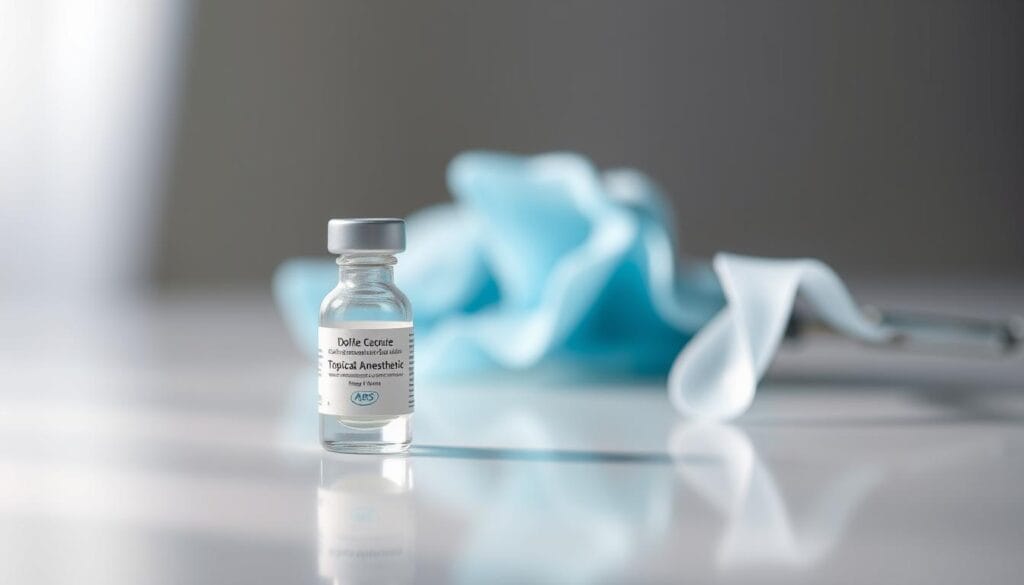
Alternatives to Traditional Needles
As the fear of needles continues to be a prevalent issue, the medical community has been exploring innovative alternatives to traditional needle-based procedures. These novel techniques not only aim to alleviate anxiety but also offer promising advancements in healthcare delivery.
Needle-Free Vaccination Techniques
One exciting development is the rise of needle-free vaccination methods. These approaches, such as jet injectors and microneedle patches, use high-pressure air or tiny dissolvable needles to administer vaccines without the use of traditional hypodermic needles. This can significantly reduce the discomfort and fear associated with traditional vaccinations, making the process more accessible and comfortable for those with trypanophobia.
Emerging Technologies in Drug Delivery
In addition to needle-free vaccinations, researchers are also exploring innovative drug delivery methods that minimize the use of traditional knitting needles. These emerging technologies include transdermal patches, microneedle arrays, and even oral thin films, which can administer medications without the need for injections. These alternatives not only address the fear of needles but also provide more convenient and patient-friendly options for drug administration.
The development of these innovative needle-free solutions is a testament to the medical community’s commitment to addressing the needs of individuals with a fear of needles. As these technologies continue to evolve, they hold the promise of making healthcare more accessible and comfortable for all.
Cultural Perspectives on Needles
Across the globe, cultural attitudes towards medical needles and vaccination practices vary greatly. Understanding these diverse perspectives is crucial in addressing needle phobia and promoting healthcare accessibility worldwide.
Global Attitudes Towards Vaccination
In some cultures, vaccination is viewed as a routine, even essential, preventive measure. However, in other regions, vaccination can be met with skepticism or outright resistance due to religious beliefs, distrust of medical authorities, or concerns about safety. These divergent attitudes towards vaccination attitudes can significantly impact public health initiatives and community wellbeing.
Needle Rituals in Different Cultures
Beyond the medical context, needles and related tools hold deep cultural significance in many societies. Some cultures incorporate cultural rituals involving needles, such as acupuncture, tattoos, or body piercings, as part of spiritual practices, rites of passage, or artistic expression. These medical needles can carry profound symbolic meaning and play a vital role in cultural identity and traditions.
“Needles are not just instruments of healthcare in many cultures, but rather vessels of profound cultural significance and personal expression.”
Recognizing and respecting these diverse cultural perspectives can foster greater understanding and empathy when addressing needle-related fears and concerns within different communities.
Support Groups and Resources
Navigating the fear of needles, also known as trypanophobia, can feel isolating, but you’re not alone. Support groups and professional resources are available to help you overcome this common phobia and regain confidence in medical procedures.
Finding Community Support
Connecting with others who share your experiences can be invaluable. Support groups provide a safe space to share your struggles, learn coping strategies, and find encouragement from those who understand. Whether in-person or online, these communities offer a sense of belonging and can make a significant difference in your journey to conquer needle fear.
Professional Counseling Options
For those seeking more structured support, professional counseling can be highly beneficial. Therapists trained in exposure therapy and cognitive-behavioral techniques can help you gradually confront your fear, develop coping mechanisms, and address the underlying psychological factors contributing to your needle anxiety.
| Support Groups | Counseling Options |
|---|---|
|
|
By seeking out these resources and support systems, you can take the first steps towards overcoming your fear of needles and acupuncture needles. Remember, you don’t have to face this challenge alone – help is available to guide you towards a more comfortable and confident relationship with medical procedures.
The Role of Education in Needle Fear
Educating children about needles and medical procedures can play a crucial role in helping them overcome their fear and anxiety. By providing age-appropriate resources and strategies, parents and guardians can empower their children to approach healthcare with confidence and resilience.
Educating Children About Needles
It’s important to start the conversation about needles early and maintain an open dialogue. Children’s education should focus on explaining the purpose of needles, such as vaccinations and blood draws, in a calm and reassuring manner. Using visual aids, storybooks, and role-playing can help children understand the process and develop coping mechanisms.
- Introduce the topic of needles in a positive, age-appropriate way
- Explain the reasons for medical procedures that involve needles
- Encourage children to express their feelings and concerns openly
- Provide opportunities for hands-on learning, such as practicing with a doll
Resources for Parents and Guardians
Parental resources are essential in helping families navigate the challenges of hypodermic needles and needle fear. Healthcare providers, educational institutions, and support organizations offer a wealth of information and strategies to support parents and guardians in preparing their children for medical procedures.
- Educational pamphlets and brochures on needle fear and management
- Online resources and articles with tips for talking to children about needles
- Support groups and counseling services for families dealing with needle anxiety
- Workshops and seminars on coping techniques and needle desensitization
By equipping children with knowledge and empowering parents with the right parental resources, we can work towards reducing the stigma and fear surrounding hypodermic needles and medical procedures. This holistic approach to education can help families build resilience and promote a healthier, more positive relationship with healthcare.
Personal Stories of Overcoming Needle Fear
Conquering the fear of needles, often referred to as trypanophobia, can be a deeply personal and inspiring journey. In this section, we’ll explore the real-life testimonials of individuals who have faced their fears and found empowering ways to overcome the challenges associated with needles.
Testimonials from Affected Individuals
“I’ve always had a phobia of needles, and the anxiety would rise every time I had to get a vaccination or have blood drawn. But after seeking help from a therapist and practicing exposure therapy, I was able to slowly desensitize myself to the idea of needles. Now, I can even get tattoos without the overwhelming fear I used to experience.” – Sarah, 28
“As a child, I would dread going to the doctor’s office because of the impending needle pricks. It wasn’t until I started using deep breathing techniques and visualizing a peaceful scene that I was able to get through those moments with more ease. Overcoming my needle fear has been a lifelong process, but I’m proud of how far I’ve come.” – Marcus, 35
Inspirational Journeys to Overcome Fear
- Emily, a avid rock climber, had to overcome her fear of needles to receive the necessary vaccinations for an international climbing expedition. Through a combination of cognitive-behavioral therapy and gradual exposure, she was able to conquer her phobia and embark on the adventure of a lifetime.
- John, a self-proclaimed “tough guy,” had always been embarrassed by his fear of needles. After mustering the courage to speak with his healthcare provider, he learned techniques like using a numbing cream and bringing a trusted friend to appointments, which helped him manage his anxiety and get the medical care he needed.
These personal testimonials demonstrate the power of determination, the importance of seeking professional support, and the transformative impact of overcoming the fear of needles. By sharing these inspiring journeys, we hope to empower others who are overcoming fear and pave the way for a more personal testimonials-informed approach to addressing trypanophobia.
The Future of Needle Technology
As the world of medical technology continues to evolve, innovative advancements in needle design and the potential of robotics in medical procedures are poised to transform the way we approach healthcare. From enhancing patient comfort to improving precision and efficiency, these exciting developments hold promising implications for the future of needle-based treatments and procedures.
Innovations in Needle Design
Needle design has come a long way, with researchers and engineers exploring new materials, shapes, and functionalities to address the unique challenges and concerns associated with needle-based procedures. One such innovation is the development of embroidery needles that mimic the flexibility and precision of traditional sewing needles, allowing for more comfortable and less invasive injections. Additionally, advancements in needle design have yielded ultra-thin, microneedle arrays that can deliver medications or collect samples with minimal discomfort for the patient.
The Potential of Robotics in Medical Procedures
The integration of medical robotics into the healthcare landscape holds remarkable promise for enhancing the precision and accuracy of needle-based procedures. Robotic systems equipped with advanced sensors and control mechanisms can perform delicate tasks, such as guiding needles during biopsies or delivering targeted injections, with unparalleled steadiness and reliability. This technology not only improves patient outcomes but also reduces the risk of complications and minimizes the need for repeated procedures.
| Needle Design Innovations | Potential of Robotics in Medical Procedures |
|---|---|
|
|
As the healthcare industry continues to prioritize patient-centric care and technological advancements, the future of needle technology holds the promise of revolutionizing the way we approach medical interventions. From innovative needle designs to the integration of medical robotics, these developments have the potential to enhance comfort, safety, and precision, ultimately leading to improved patient experiences and better healthcare outcomes.
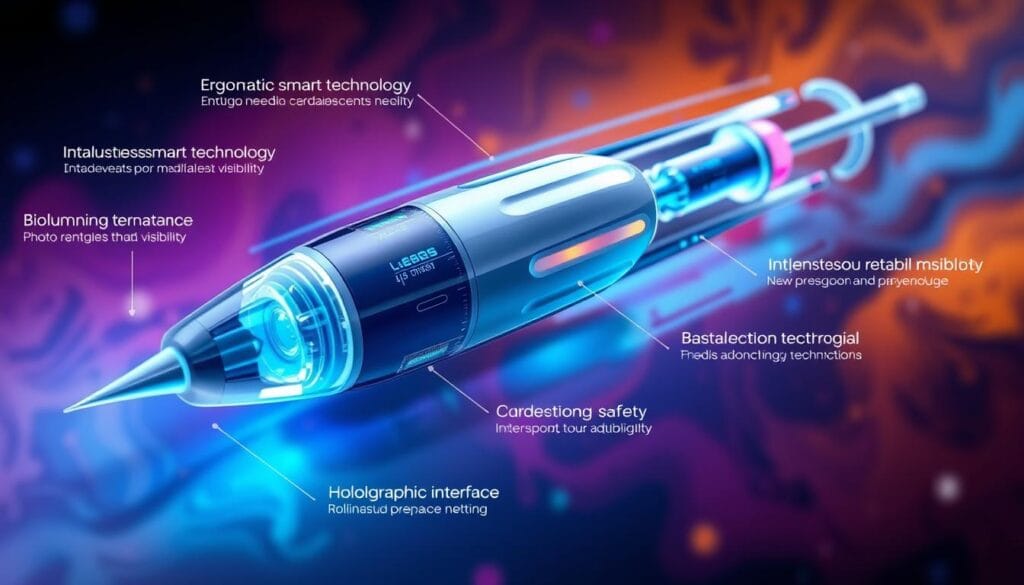
Conclusion: Moving Towards Needle Acceptance
As we conclude our exploration of the fear of needles, it’s crucial to emphasize the importance of cultivating a positive mindset towards these essential medical tools. While overcoming needle anxiety may seem daunting, adopting an empowered and optimistic approach is the key to unlocking greater comfort and acceptance.
Emphasizing Positive Mindsets
By shifting our perspective from one of fear to one of understanding and resilience, we can empower ourselves and those around us to face needle-related procedures with a newfound sense of confidence. Embracing the necessary role that needles play in healthcare, and recognizing the advancements in needle technology and design, can help us reframe the narrative and foster a more constructive relationship with these instruments.
Importance of Ongoing Support and Advocacy
Achieving widespread needle acceptance requires a collective effort, with individuals, healthcare providers, and communities working together to destigmatize this common phobia. Continued education, open communication, and the availability of supportive resources are essential in helping those with needle fear navigate their challenges and find effective coping strategies. As we move forward, let us remain committed to upholding the values of empathy, understanding, and compassion, ensuring that no one faces their needle-related struggles alone.

